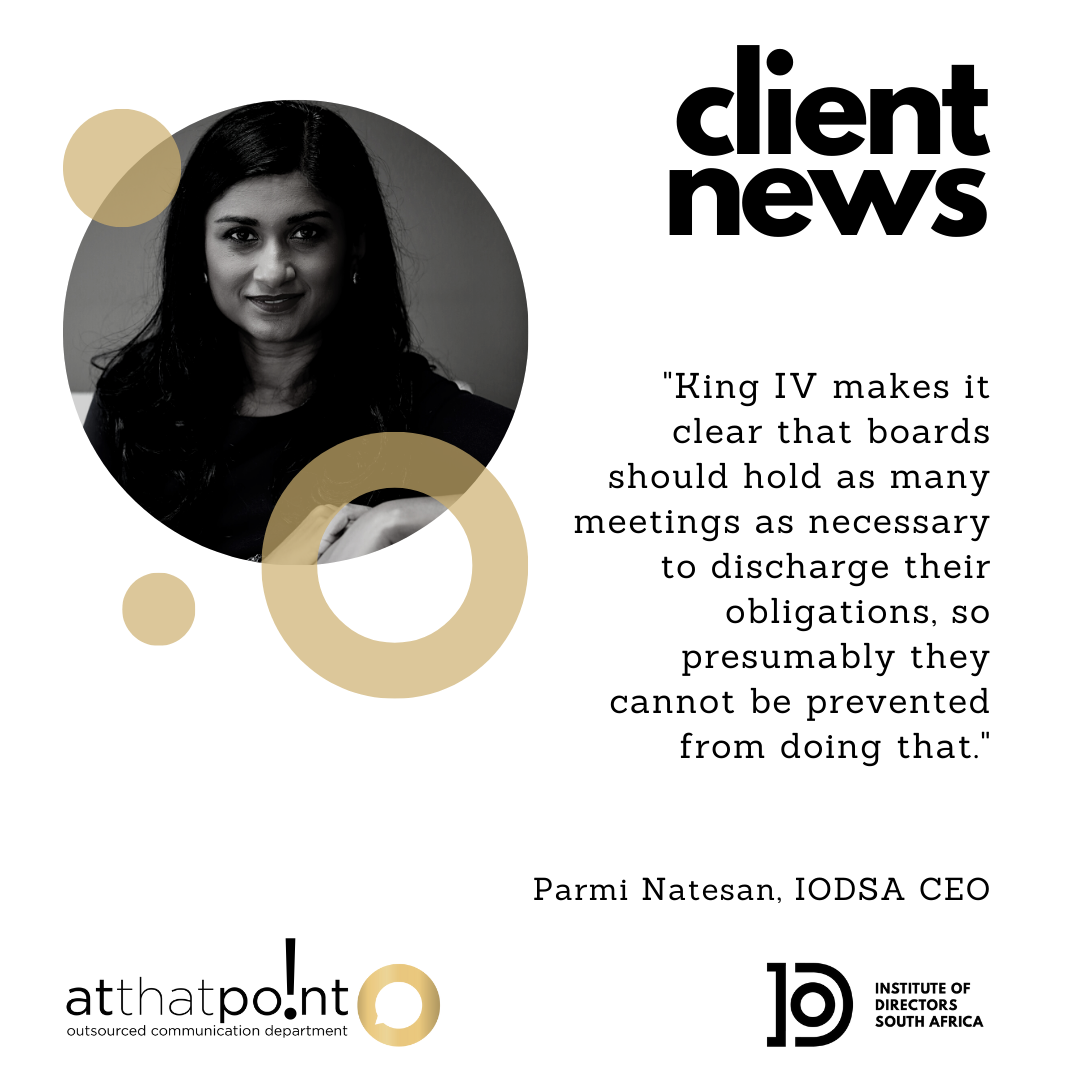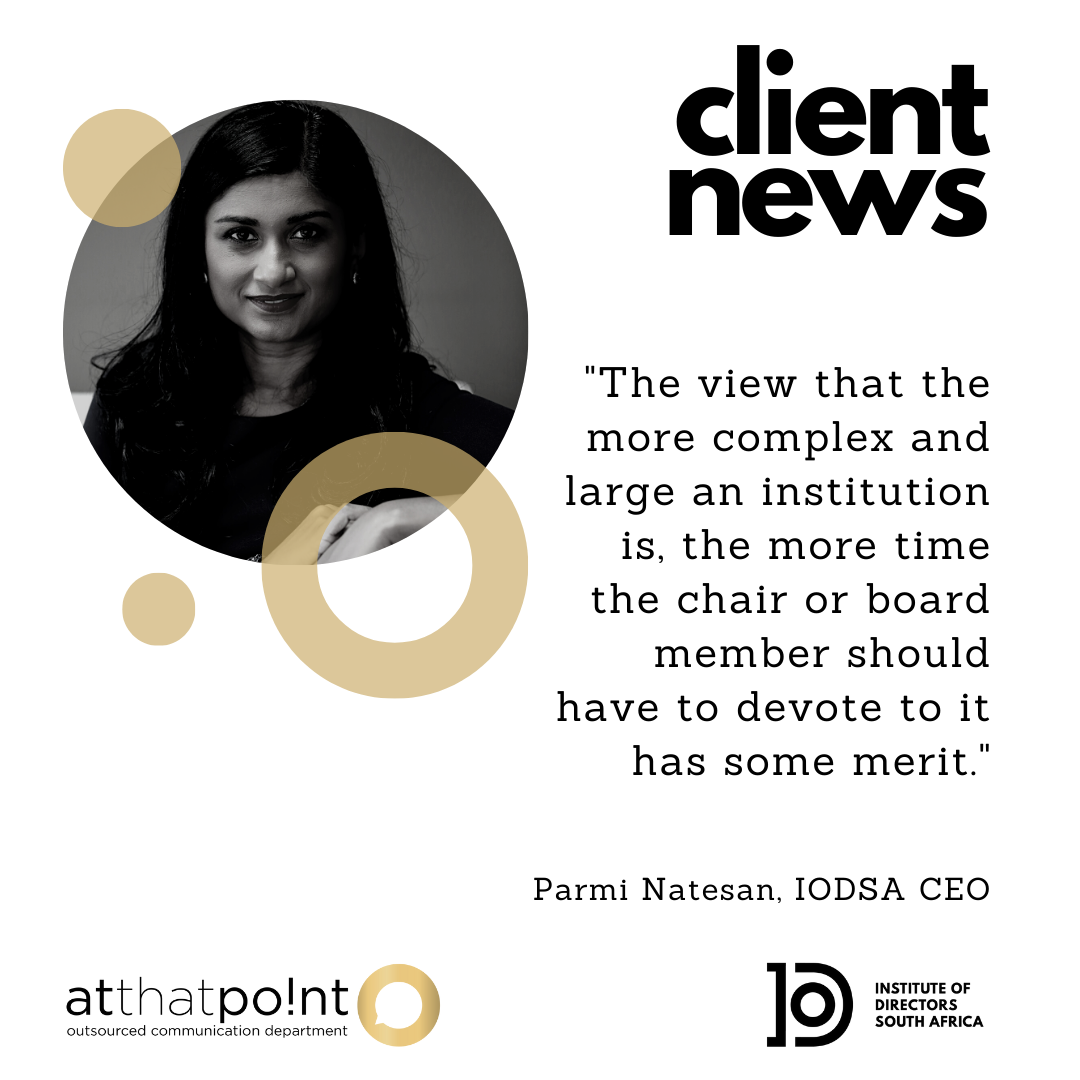|
A recent editorial in Business Day raised a perennial governance hot potato: just how many boards should a single individual be able to serve on? The tenor of the article was that the current chair of Capitec should focus on that role, and risked being distracted by chairing two other boards as well.
“The view that the more complex and large an institution is, the more time the chair or board member should have to devote to it has some merit,” says Parmi Natesan, CEO, the Institute of Directors in South Africa. “For example, the decision by the current chair of Eskom to resign as chair of a large bank to concentrate on leading the power utility’s board was probably a wise move. “However, because organisations are of varying sizes and degrees of complexity, and individuals have different capacities, the IoDSA does not believe it makes sense to attempt to create a hard-and-fast rule about how many boards an individual should be able to chair or, indeed, sit on.” She argues that it remains up to each organisation to determine how much time each board member’s role requires, and to ensure that current or prospective board members can commit to that. The individual director’s ability, experience and capacity would also be factors to consider. In addition, board chairs and directors (especially those serving on key board committees) need to have the flexibility to ramp up the time they devote to their work during periods of crisis. Individuals who are fully committed will not have that flexibility. In view of the growing realisation that governance plays a crucial role in ensuring corporate sustainability, investors are starting to take note of how many boards non-executive directors serve on. In the United Kingdom and United States, institutional investors (often via proxy services) oppose the appointment of directors with more than five board seats. In India, by contrast, the legal limit of directorships is 20. King IV addresses the problem by recommending transparency, advising independent non-executive directors to detail their other board commitments and to provide a written undertaking that they have enough time to discharge their board responsibilities (Principle 7, Recommended Practice 18). “Given the importance of the director’s role, it might make sense for boards to formalise the minimum amount of time that each role requires. The overriding principle is that the issue needs to be thoroughly ventilated and minuted to ensure there is consensus about what the role demands, and whether each director can give the time needed,” she concludes. “The Nominations Committee also plays a key role in monitoring the attendance and involvement of board members, and should act swiftly where there are capacity concerns.” ENDS MEDIA CONTACT: Stephné du Toit, [email protected], 084 587 9933, www.atthatpoint.co.za For more information on the IoDSA please visit: Website: www.iodsa.co.za Twitter: @The_IoDSA LinkedIn: Institute of Directors South Africa Company Page Facebook: Institute of Directors South Africa
0 Comments
 Just days after Mpho Phalaatse was removed as Johannesburg’s mayor, a letter to all municipal entities surfaced on social media, in which the Acting City Manager of Johannesburg instructs the boards of municipal entities to cease holding any “strategic sessions, including the [sic] Board and Sub-Committee meetings” until further notice. Boards may seek permission to hold meetings to consider any critical reports. All strategic and programme management decisions are specifically placed in abeyance, and any decisions taken since September 2022 are also put on ice. “If this letter is indeed legitimate, it’s hard not to see this move as a departure from good governance. The content of the letter also raises once again all the accountability issues that the IoDSA has consistently highlighted in relation to state- and municipality-owned entities,” says Parmi Natesan, CEO, Institute of Directors in South Africa (IoDSA). “The shareholder may appoint the boards of these entities, but once appointed these boards have a legal duty to fulfil their obligations as set out in the relevant legislation and in the King Report, and to act in the best interests of the entity.” The IoDSA has repeatedly pointed out that many of the issues that plague state- and municipality-owned entities can be traced back to the improper exercise of power by the shareholder. By usurping what should properly be the functions of the board, the shareholder makes it impossible for the board to be held accountable, or for the board to hold management accountable. “Boards are supposed to act independently, but this letter clearly demonstrates that, in the City of Johannesburg at least, they are being prevented from doing so,” she says. Ms Natesan goes on to point out that forbidding the boards of the municipal entities to meet means that they cannot fulfil their duties and exercise oversight properly. “Municipalities are commonly known for lack of service delivery, as well as fruitless and wasteful expenditure, so preventing boards and audit committees, from meeting and thus exercising oversight, will potentially open the door to even more of the same,” she comments. It is questionable whether any appointed board can be prevented from discharging its legal duties. Time will tell whether such action will stand up to scrutiny and legal challenge. “King IV makes it clear that boards should hold as many meetings as necessary to discharge their obligations, so presumably they cannot be prevented from doing that,” she concludes. “This gross interference in the board’s exercise of its governance function is a terrible way for the City’s new administration to begin. The IoDSA urges the new mayor and his executive to take speedy action to confirm their adherence to the principles of good governance as outlined in the legislation and King IV.” ENDS MEDIA CONTACT: Stephné du Toit, [email protected], 084 587 9933, www.atthatpoint.co.za For more information on the IoDSA please visit: Website: www.iodsa.co.za Twitter: @The_IoDSA LinkedIn: Institute of Directors South Africa Company Page Facebook: Institute of Directors South Africa The Institute of Directors in South Africa (IoDSA) and King Committee have issued the draft sectoral supplements for the new King Code of Corporate Governance (King IV) for comment. The King IV Supplements will be open for comment from 11 May to 11 July, and all comments should be submitted via the comment platform on the IoDSA’s website.
Prof Mervyn King, chair of the King Committee, says that the supplements are aimed at providing state owned entities, small to medium-sized enterprises (SMEs), retirement funds and other institutional investors, non-profit organisation and municipalities with guidelines on how to apply the King Code for their particular circumstances. “Traditionally, corporate governance has focused on listed companies. However, this does not take into account that corporations all exist in a bigger ecosystem. The ecosystem is made up of the relationships and interactions amongst companies, investors, SMEs within supply chains, civil society and state owned entities, which supply essential infrastructure,” says King. “To bring about large-scale change, one has to address governance across the whole of this ecosystem.” Ansie Ramalho, the King IV Project Lead says that this inclusive, systemic approach breaks new ground for the King Codes, and for corporate governance more generally. She emphasises that the supplements are not standalone codes, and must be read in conjunction with the main King IV report. They also do not seek to provide detailed guidance, but rather to provide each sector with examples of some of its corporate governance challenges, and how to respond to them. These challenges might include relevant legislation, ownership structures, board composition or simply the nature of the business they are in. “We have not attempted to provide exhaustive examples of challenges and solutions, but rather to provide insight into the kind of thinking that should be used to apply King IV to a particular sector. In this way, we hope to provide organisations with the tools they need to craft their own sound governance response to any challenge when applying the principles of King IV,” says Ramalho. The main King IV draft has been open for comment since 15 March and no further comment will be accepted after 15 May. The King IV draft document and link to public commentary platform is available at http://www.iodsa.co.za/page/KingIVcommentary ENDS MEDIA CONTACT: Cathlen Fourie, 082 222 9198, [email protected], www.atthatpoint.co.za For more information on the IoDSA please visit: Website: www.iodsa.co.za Twitter: @The_IoDSA LinkedIn: The Institute of Directors in Southern Africa group  The Institute of Directors in Southern Africa (IoDSA) and the King Committee have made the draft version of the latest King Report—King IV—available for public comment today. Those wishing to comment will be able to access the document via an electronic portal, which will also provide a mechanism for submitting comments. The King Committee under the leadership of Prof Mervyn King and the King IV task team, led by Ansie Ramalho, the former CEO of the IoDSA, have been working on the new document since late 2014. Ramalho says that a number of developments in corporate governance made a new version necessary. Among these developments are the increased focus on executive remuneration; the key role of social and ethics committees, the regulations for which only came out after the launch of King III; and the continuing development of Integrated Reporting, which was first recommended in King III. “The King Codes have helped make South Africa a global leader in corporate governance—subjecting King IV to the rigor of public comment is thus important,” says Prof Mervyn King. “King IV breaks new ground by offering an integrated approach to corporate governance encompassing the economic, social and environmental spheres as well. It also impacts on sectors other than listed or large companies such as state-owned enterprises, local government, non-profits, SMEs and retirement funds, among others. Quality and effective corporate behaviour offers a way out of many of our current economic and sustainable development challenges.” King IV differs from King III in a number of ways. The Code is now integrated into the Report, with a clear differentiation between principles and practices, with the latter linked to outcomes—these and other innovations are designed to make it easier to use. Especially noteworthy, King III’s “apply or explain” has become “apply and explain”. The intention here, Ramalho explains, is to help organisations move beyond a compliance mind-set to describing how implemented practices advance progress towards giving effect to each principle - the application of which is assumed due to it being basic to good governance. The process of obtaining public comment will take place over two phases. The current first phase will cover the King IV Report (bar the Sector Supplements), which sets out philosophy, concepts and the foundational principles. Comment on the Sector Supplements, which are dependent on the main report, will be sought in phase two. While the main report is in the public domain for comment, this approach will allow Ramalho’s team will solicit further specialist comment on the sector supplements before they are released for public comment. The main report has already had the benefit of comment from institutional members of the King IV Committee, corporate governance specialists, directors, preparers, users and academics. “Too many people see corporate governance as a compliance issue whereas it is actually a critical tool for strengthening all our public and private institutions, to the benefit of the whole economic system. The overriding message of King IV is that good corporate governance practices help any organisation improve its ability to sustain itself and the social and environmental context in which it operates. The process of public input will also help to drive buy-in across the various stakeholder communities,” concludes Ramalho. “The more difficult the external circumstances are, the more valuable a strong corporate governance culture is.” Any member of the public may comment, either in a personal capacity or on behalf of an organisation. Comments may be made on any aspect of the Report, but the drafting committee has also posted a list of questions to which it would particularly value input. However, no anonymous contributions will be entertained, and the details of each commentator and their comments will be in the public domain. The comment period for each of the two phases is two months. ENDS MEDIA CONTACT: Cathlen Fourie, 082 222 9198, [email protected], www.atthatpoint.co.za For more information on the IoDSA please visit: Website: www.iodsa.co.za Twitter: @The_IoDSA LinkedIn: The Institute of Directors in Southern Africa group |
Archives
July 2024
Categories
All
|


 RSS Feed
RSS Feed